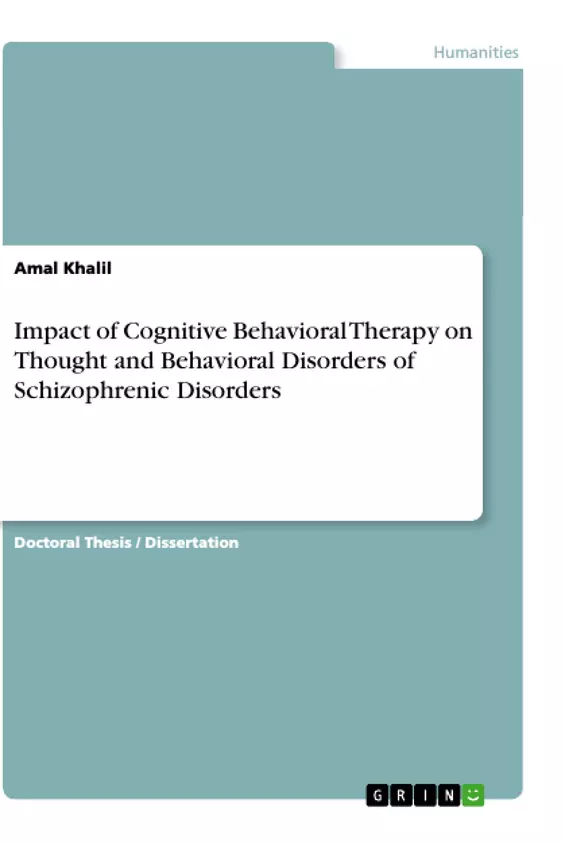The aim of the present study was constructing a technique of cognitive behavioral therapy related to schizophrenic patients, implementing this program & finally evaluating its impact on patients’ developing more adaptive ways of thinking & behavior and ability to acquire social skills essential for social interactions & functioning.
Schizophrenia has significant impact on patient’s lifestyle due to its effect on patients’ cognition, perception, attention, physical function and their psychosocial skills. Cognitive behavioral therapy is a part of treatment modalities developed recently for treating schizophrenic patients. The cognitive behavioral therapy and psychosocial intervention in many studies proved its effectiveness in preventing relapse, improving coping skills, developing better social & vocational functioning and abilities to function more independently.
The sample consisted of 40 schizophrenic patients from inpatient department of Tanta Mental Health Hospital, Ministry of Health. Five instruments were used to collect the data for the current study. Sociodemographic & personal characteristics sheet, Breif Psychiatry Rating Scale, Taylor Anxiety Manifest Scale,the arabic version of Wechsler Adult Intelligence Scale (WAIS) developed by Mellika, and Observational Behavioral Assessment Sheet developed by Omar, 1993.
After assessment the sample was classified into two group (experimental group) & (control group). A constructed cognitive behavioral intervention was developed by the researcher &implemented with experimental group on 24 sessions, twice weekly, 45-60 minutes for each.
Data were statistically analyzed &results revealed that there was a significant difference between experimental & control group regarding their reduction of psychotic symptoms, Anxiety level & information processing. In addition to increased abilities of experimental group in social skills acquisition.
Key words: Schizophrenia, Patients, cognitive behavioral therapy, disorders, symptoms management.
Inhaltsverzeichnis (Table of Contents)
- Introduction
- Aim of the Study
- Review of the Literature
- Methodology
- Results
- Discussion
- Conclusion & Recommendations
- Summary
- References
- Appendix
- Arabic Summary
Zielsetzung und Themenschwerpunkte (Objectives and Key Themes)
This dissertation investigates the impact of Cognitive Behavioral Therapy (CBT) on the thoughts and behavioral disorders of schizophrenic patients. It aims to assess the effectiveness of CBT in managing symptoms and improving overall well-being for individuals diagnosed with schizophrenia.
- The effectiveness of CBT in managing schizophrenic symptoms
- The impact of CBT on the thoughts and behaviors of schizophrenic patients
- The role of nursing in the implementation and evaluation of CBT for schizophrenic patients
- The potential benefits and limitations of CBT for schizophrenic patients
- The importance of individualized treatment approaches for schizophrenic patients
Zusammenfassung der Kapitel (Chapter Summaries)
The dissertation starts with an introduction outlining the research problem and the significance of the study. It then provides a comprehensive review of the literature on schizophrenia, CBT, and the intersection of these two areas. The methodology section details the research design, participants, data collection methods, and data analysis techniques. The results section presents the findings of the study, analyzing the impact of CBT on the target variables. The discussion chapter interprets the findings, integrating them with existing literature and highlighting their implications for clinical practice. Finally, the conclusion section summarizes the key findings and recommendations for future research.
Schlüsselwörter (Keywords)
This study focuses on the application of Cognitive Behavioral Therapy (CBT) to address the thoughts and behavioral disorders associated with schizophrenia. Key concepts include schizophrenic symptoms, CBT interventions, therapeutic outcomes, and nursing care. The research explores the potential of CBT as a therapeutic approach for managing schizophrenia and improving the well-being of affected individuals.
Frequently Asked Questions
What is the focus of this dissertation?
The study focuses on the impact of Cognitive Behavioral Therapy (CBT) on thought and behavioral disorders in patients with schizophrenia.
What were the main findings regarding CBT effectiveness?
CBT significantly reduced psychotic symptoms, anxiety levels, and improved information processing and social skills in the experimental group.
How many patients participated in the study?
The sample consisted of 40 schizophrenic patients from the inpatient department of Tanta Mental Health Hospital.
How was the CBT program structured?
The intervention consisted of 24 sessions, held twice weekly, with each session lasting 45 to 60 minutes.
Which psychological scales were used for assessment?
Tools included the Brief Psychiatry Rating Scale, Taylor Anxiety Manifest Scale, and the Wechsler Adult Intelligence Scale (WAIS).
Can CBT help prevent relapse in schizophrenia?
Yes, the literature review suggests that CBT and psychosocial interventions are effective in preventing relapse and improving independent functioning.
- Citar trabajo
- Amal Khalil (Autor), 2004, Impact of Cognitive Behavioral Therapy on Thought and Behavioral Disorders of Schizophrenic Disorders, Múnich, GRIN Verlag, https://www.grin.com/document/1150965



